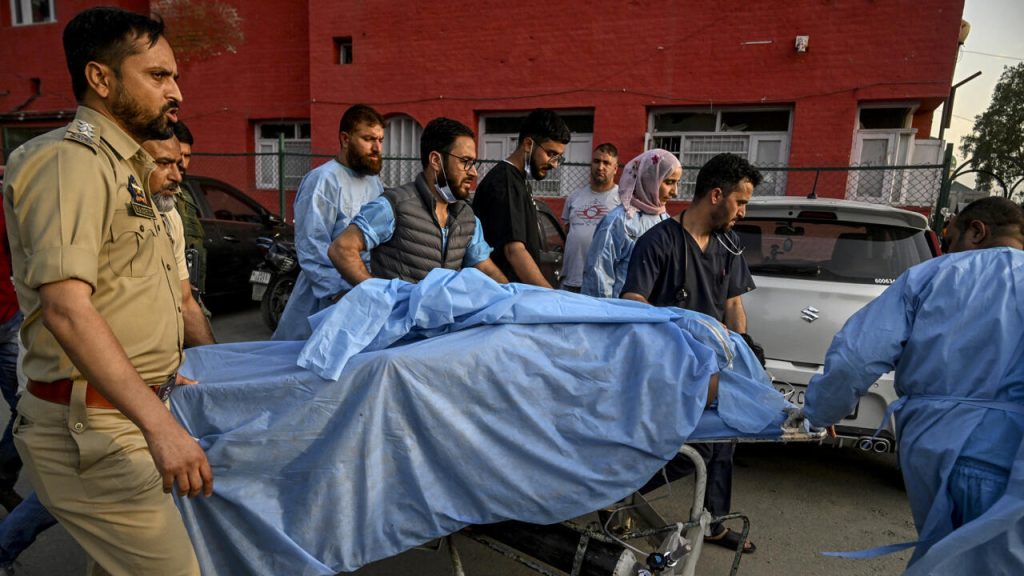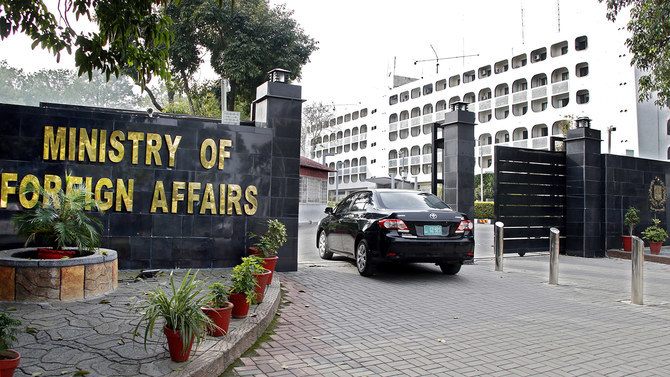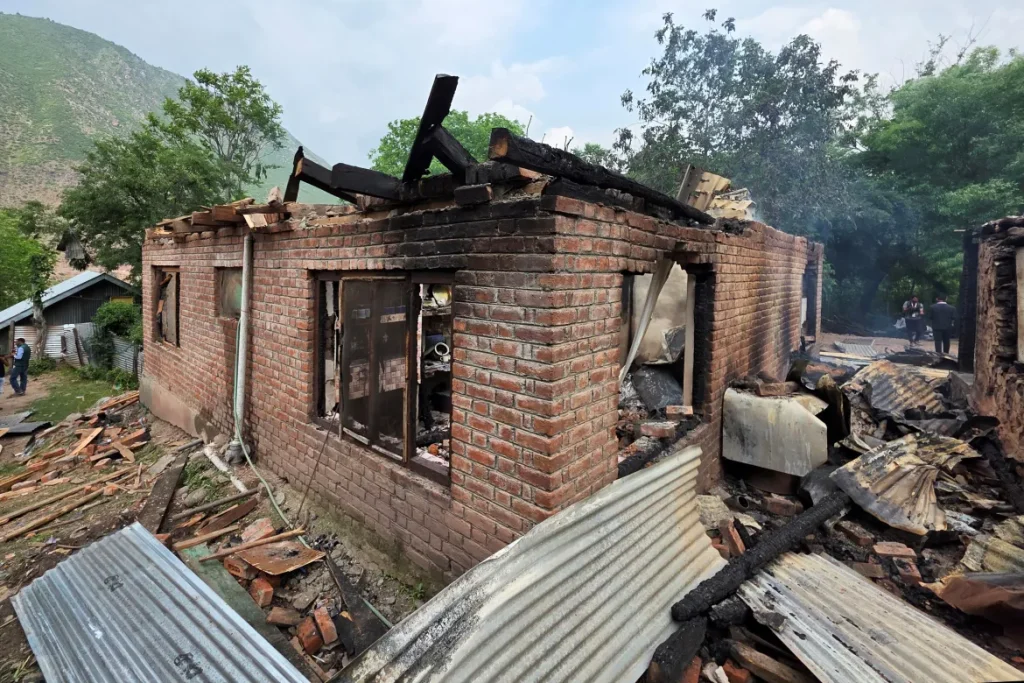In recent years, Washington has supplied India with advanced aircraft, helicopters, and military equipment.
Therefore, experts weren’t surprised when Trump, known for his unconventional diplomacy, touched on a highly sensitive issue for Delhi.
India claims Kashmir as an integral part of its territory and strongly opposes any form of dialogue—particularly third-party mediation.
We appreciate President Trump’s offer to support efforts for resolving the Jammu and Kashmir dispute. Pakistan Foreign Affairs office
British Broadcaster’s Report: Delhi now forced to walk a delicate path
Islamabad ( Web News)
U.S. President Donald Trump’s offer to mediate on the Kashmir issue has put India in a difficult position. In India, the main opposition party, the Congress, has demanded clarification from the government, questioning whether the Modi administration has opened the door for third-party mediation.
According to a report by a British broadcaster, for decades one principle has remained sacrosanct in India’s Ministry of External Affairs: opposition to third-party mediation—especially in the long-standing dispute with Pakistan over Kashmir. Therefore, experts weren’t surprised when Trump, known for his unconventional diplomacy, touched on a highly sensitive issue for Delhi.
On Saturday, Trump announced on social media that under U.S. mediation, India and Pakistan had agreed to a full and immediate ceasefire after four days of intense border skirmishes. In another message, he said:
“I will work with both of you to find a solution to the Kashmir issue, even if it takes a thousand years.”
It is worth noting that the Kashmir dispute dates back to 1947, after the partition of British India and the creation of Pakistan. Both countries claim Kashmir in full, but only control parts of it. Despite decades of bilateral negotiations, no resolution has been reached.
India claims Kashmir as an integral part of its territory and strongly opposes any form of dialogue—particularly third-party mediation.

The latest tensions erupted after India carried out airstrikes in Pakistan last month following an attack on tourists in Indian-administered Kashmir that killed 26 people, mostly tourists. India blamed Pakistan, an accusation Islamabad has denied.
Trump’s intervention came at a time when tensions between the nuclear-armed neighbors threatened to escalate into full-scale war. Fighter jets, missiles, and drones were being used by both sides, with each claiming to have targeted military positions in the border areas.
Though American mediators and back-channel diplomacy helped avert large-scale conflict, Trump’s offer has cornered Delhi.
Former Indian Foreign Secretary Shyam Saran told the BBC:
“The Indian side will certainly not welcome this offer, as it goes against our long-standing position.”
Islamabad, on the other hand, welcomed Trump’s remarks. A statement from Pakistan’s Ministry of Foreign Affairs said:
“We appreciate President Trump’s offer to support efforts for resolving the Jammu and Kashmir dispute. It is a longstanding issue that poses serious implications for peace and security in South Asia and beyond.”
In 2019, when India revoked Jammu and Kashmir’s special status, its stance on the region hardened, leading to mass protests. Trump’s recent comments have angered many Indians, who view them as an attempt to internationalize the Kashmir issue.

India’s opposition Congress Party has demanded a clarification from the government and called for an all-party meeting, particularly since Washington announced the ceasefire before Delhi did.
Congress spokesperson Jairam Ramesh said:
“Have we opened the door to third-party mediation?”
The party also wants to know whether diplomatic ties between India and Pakistan are being restored.
U.S. Secretary of State Marco Rubio stated that both countries have agreed to initiate dialogue on key issues at a neutral venue. This took Indian officials by surprise.
Delhi has refused to engage in talks with Islamabad, accusing it of supporting cross-border terrorism. Historically, India has opposed third-party involvement based on the 1972 Simla Agreement, signed after the 1971 war, under which both nations agreed to resolve issues bilaterally and peacefully.
Indian officials also argue that any understanding reached with Pakistan’s civilian government is undermined by the country’s powerful military. They cite the 1999 Kargil War, which flared up even after both Prime Ministers had committed to bilateral dialogue and non-interference in each other’s internal affairs.
So far, Modi’s government has not issued an official response to Trump’s mediation offer. However, Indian Foreign Minister S. Jaishankar stated:
“India has always maintained a strong and uncompromising stance against terrorism in all its forms, and will continue to do so.”
This is seen as an indication that India is not interested in initiating bilateral dialogue anytime soon.

In Islamabad, Executive Director of the Centre for Research and Security Studies Imtiaz Gul told the BBC:
“Pakistan has always wanted third-party mediation on Kashmir because there is a lack of mutual trust between the two countries.”
He added that Pakistan views the involvement of a global power as a moral victory.
Defense analyst Syed Muhammad Ali in Pakistan stated that India’s continued refusal compels the international community to intervene in order to prevent future conflicts.
“Kashmir is among the most critical issues for the international community. The rapidly escalating tension shows that the situation can spiral out of control at any time.”
Since coming to power in 2014, Indian Prime Minister Narendra Modi’s aggressive diplomacy has been seen as a reflection of India’s growing confidence as an emerging global economic power.
But now, India must strike a delicate balance to resist Trump’s mediation efforts without straining its strategic ties with Washington. The U.S. sees India as a key partner in countering China’s growing influence and includes it in the QUAD alliance alongside Australia and Japan to maintain balance in the Indo-Pacific region.
In recent years, Washington has supplied India with advanced aircraft, helicopters, and military equipment. India, with a 1.4 million-strong military, is keen to modernize its forces but still heavily relies on Russian arms.
Previous U.S. administrations were mindful of India’s sensitivity around Kashmir and avoided involvement. But Trump has raised questions about whether that policy still holds.
The U.S. is India’s largest trading partner. By 2024, bilateral trade had reached approximately $130 billion. The Modi government is also in talks with Washington on a trade deal to avoid tariffs.
For Delhi, this has become a tightrope walk: it wants to ensure Trump’s mediation or the U.S.-brokered ceasefire doesn’t lead to deeper involvement, while also maintaining warm trade relations with Washington.
Any move to broaden dialogue—especially on issues like water sharing or Kashmir’s status—could trigger intense domestic backlash, something Prime Minister Modi is acutely aware of.

